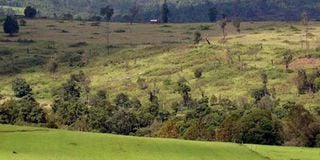Owners of idle farm land face higher taxes if law passed, CS Bett says

Idle land. The government will punish owners of idle fertile land in what it said was a bid to increase the area of crop production, Agriculture CS Willy Bett has said. FILE PHOTO | NATION MEDIA GROUP
What you need to know:
At least 60,000 acres of fertile land lies idle under the custody of parastatals and private owners, said the CS.
Currently, the law gives every Kenyan the right to own a property privately, provided that it has been acquired legally.
- And while the management of land is a responsibility of the national government, counties will also be part of the plan.
The government will punish owners of idle fertile land in what it said is a bid to increase the area of crop production.
Agriculture Cabinet Secretary Willy Bett Wednesday said that the ministry will propose a change in law to compel owners of unused land to pay higher taxes on the properties should they fail to either use them for farming or lease them to investors.
Also targeted are parastatals which Mr Bett said own huge parcels of arable land but most of which were idle.
At least 60,000 acres of fertile land lies idle under the custody of parastatals and private owners, said the CS.
“If you have land and you are not using it, it is just in order that we compel you to lease it out. If not, then you will pay penalties. We will look into the law to make that possible,” said Mr Bett.
CHANGE LAW
Mr Bett added that the law change, which will be done in partnership with the Land ministry, will help the government to achieve its target of a food secure nation by increasing production which is currently projected at 37 million for 2017.
Currently, the law gives every Kenyan the right to own a property privately, provided that it has been acquired legally.
The Constitution states that such a property, can be held either individually or in association with others.
AGRICULTURE PROJECTS
Speaking during a seminar at Safari Park hotel organised by USAid to highlight the achievements of a five-year agriculture project that targeted small-scale farmers in the counties, the CS said the solution to the poor farm yields experienced across the country, was to increase the land under crop, besides promoting better farming techniques by farmers.
“Our projection is that by 2020, we are self-sufficient in maize production,” he said.
The CS spoke at a seminar .
The Kenya Agriculture Value Chain Enterprise project (Kaves), has benefitted at least half a million farmers, raising the prospect of improving food security, said Mr Bett.
“The food processing initiatives started are commendable and we can only achieve 100 percent food and nutrition security by building institutions and relationships that are beneficial,” said the CS at the Safari Park Hotel in Nairobi.
The project, which was begun in January 2013, will end in January 2018.
Dr Steve New, the USAid-Kaves chief of party, said: “There is honey in farming through building public-private partnerships that enhance competitiveness.”
FARMERS
Council of Governors agriculture committee chairman Okoth Obado said plans are underway to create technical working groups at the counties to ensure that the initiatives started are sustainable by supporting smallholder farmers.
And while the management of land is a responsibility of the national government, counties, which are responsible for the collection of land rates and levies, will also be part of the plan to penalise farmers for idle land.
Mr Obado said the counties will help enact the proposals.
“Because the market has regained confidence through assured markets, we have opportunities to ensure smallholder farmers are have increased incomes, through labour-saving projects, subsidised rates to farm inputs and incentives that promote uptake of agribusiness.”
US ambassador Robert Godec said that increase in productivity and income and nutrition through training and capacity building have been the key milestones recorded by the USAid-Kaves.
“This programme has done great things and is playing a role in impacting lives in food security considering that 800 million people worldwide are chronically undernourished. We celebrate this successful project under USAid-Kaves that reached out to about one million smallholder farmers as part of the huge Feed the Future Initiatives,” he said.





